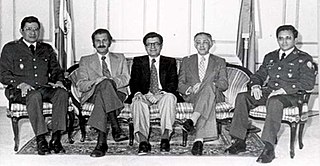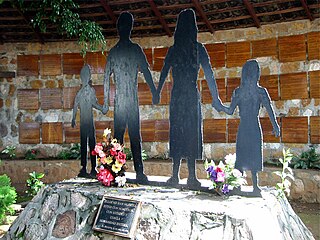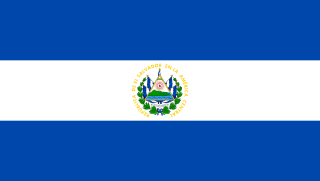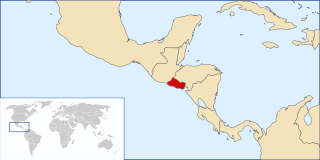 W
WThe Salvadoran Civil War was a civil war in El Salvador which was fought between the military-led junta government of El Salvador and the Farabundo Martí National Liberation Front (FMLN) from 15 October 1979 to 16 January 1992. A coup on October 15, 1979, was followed by killings of anti-coup protesters by the government and of anti-disorder protesters by the guerrillas, and is widely seen as the start of civil war.
 W
WThe 1979 Salvadoran coup d’état was a military coup d'état that occurred in El Salvador on 15 October 1979. The coup, led by young military officers, bloodlessly overthrew military President Carlos Humberto Romero and sent him into exile. The National Conciliation Party's firm grasp on power was cut, and in its place, the military established the Revolutionary Government Junta of El Salvador (JRG). The junta was composed of two military officers and three civilians.
 W
WThe Chapultepec Peace Accords were a set of peace agreements signed on January 16, 1992, which brought an end to the Salvadoran Civil War. The treaty established peace between the Salvadoran government and the Farabundo Martí National Liberation Front (FMLN). It was signed in Chapultepec Castle, Mexico.
 W
WThe Christian Democratic Party is a Christian democratic party in El Salvador. After being officially disbanded by the Supreme Court in 2011, it continued to work under the name of Party of Hope, before re-taking its original name in 2012.
 W
WThe Communist Party of El Salvador was the official communist political party in El Salvador. The Communist Party was founded by Miguel Mármol on 10 March 1930.
 W
WCoordinadora Revolucionaria de Masas was a coordination of revolutionary mass organizations in El Salvador formed on January 11, 1980.
 W
WDeath squads in El Salvador were right-wing paramilitary groups acting in opposition to Marxist-Leninist guerrilla forces, most notably of the Farabundo Martí National Liberation Front, and their allies among the civilian population before, during, and after the Salvadoran Civil War. The paramilitaries committed the vast majority of murders and massacres during the civil war and were heavily aligned with the United States-backed government.
 W
WThe El Calabozo massacre was an incident during the Salvadoran Civil War on 21–22 August 1982, in which more than two hundred people, including children and elderly, were reportedly killed at El Calabozo by the Atlacatl Battalion of the Salvadoran Army.
 W
WThe El Mozote Massacre took place in and around the village of El Mozote, in Morazán Department, El Salvador, on December 11 and 12, 1981 when the United States-trained Salvadoran Army killed more than 800 civilians during the Salvadoran Civil War. The army had arrived in the village on the 10th, following clashes with guerrillas in the area.
 W
WThe ofensiva hasta el tope was the major engagement of the Salvadoran Civil War. The battle, fought between the Farabundo Martí National Liberation Front Marxist guerrilla and the Salvadoran government, lasted from the 11 November to early December 1989. Sometimes referred to as "Ofensiva fuera los fascistas. Febe Elizabeth vive", in honor of an assassinated union leader, it was the most brutal confrontation in the entire conflict, amounting for seventeen percent of the total casualties in ten years of warfare.
 W
WLas Fuerzas Armadas de la Resistencia Nacional was the military arm of National Resistance, a Salvadoran communist organization that was founded on May 10, 1975 when ideological differences within the ERP and the assassinations of Roque Dalton and Armando Arteaga made some members break away from the ERP. Ernesto Jovel was its first general secretary. Other founding members of the RN included Eduardo Sancho, Lil Milagro Ramírez, Julia Rodríguez and Arsenio.
 W
WThe Fuerzas Populares de Liberación "Farabundo Martí" (FPL) was a left wing guerrilla military and political organization in El Salvador. It was the oldest of the five groups who in 1980, merged to form the Frente Farabundo Martí para la Liberación Nacional (FMLN).
 W
WThe Battle of Ilopango Airport was a military engagement fought at the Ilopango International Airport in El Salvador in late January 1981. The battle was a part of the Salvadoran Civil War. It was fought between soldiers of the Salvadoran Air Force and guerrillas of the Farabundo Martí National Liberation Front.
 W
WMuseum of the Revolution is a museum commemorating the antecedents and events of the Salvadoran Civil War, which took place from approximately 1980 until 1992. The museum is located in Perquín, in the Morazán Department of El Salvador. This area was dominated during the war by the Farabundo Martí National Liberation Front (FMLN).
 W
WThe National Guard was the national gendarmerie of El Salvador.
 W
WThe Nationalist Republican Alliance is a conservative, right-wing political party of El Salvador. It was founded on 30 September 1981 by retired Salvadoran Army Major Roberto D'Aubuisson. It defines itself as a political institution constituted to defend the democratic, republican, and representative system of government, the social market economy system and nationalism.
 W
WOne Day of Life is a novel by Salvadoran author Manlio Argueta. The novel is set in Chalatenango, El Salvador and follows the daily life of Guadalupe Guardado and the women of her family just prior to the Salvadoran Civil War. The book was banned by the government of El Salvador after its 1980 release for its descriptions of human rights violations by the Organización Democrática Nacionalista, the government's paramilitary intelligence organization.
 W
WONUCA and ONUSAL were two United Nations peacekeeping missions deployed in Central America during the late 1980s and early 1990s.
 W
WORDEN or Organización Democrática Nacionalista was a Salvadoran paramilitary organization founded under the military rule of Julio Adalberto Rivera, headed by José Alberto Medrano. ORDEN helped control the 1972 elections, in which reform-minded José Napoleón Duarte lost to Arturo Armando Molina due to fraud.
 W
WThe People's Revolutionary Army was one of five leftist guerrilla organizations that comprised the Farabundo Martí National Liberation Front (FMLN). Formed on October 10, 1980, the FMLN was one of the main participants in the Salvadoran Civil War (1979-1992).
 W
WThe People's Revolutionary Bloc was a Salvadoran militant organization that was founded by the Farabundo Martí Liberation People's Forces (FLP) in 1975. The BPR was mainly composed intellectuals, teachers, students, and rural peasants and workers. The group was led by General-Secretary Julio Flores.
 W
WRadio Venceremos was an 'underground' radio network of the anti-government Farabundo Martí National Liberation Front (FMLN) during the Salvadoran Civil War. The station "specialized in ideological propaganda, acerbic commentary, and pointed ridicule of the government". The radio station was founded by Carlos Henríquez Consalvi (Santiago).
 W
WResistencia Nacional was a Salvadoran political party. It began as a revolutionary organization founded on March 10, 1975 which became part of the FMLN coalition in 1980, against the military junta in the Salvadoran Civil War.
 W
WThe Revolutionary Government Junta was the name of three consecutive military dictatorships that ruled El Salvador between 15 October 1979 and 2 May 1982.
 W
WSalvador is a 1983 book-length essay by Joan Didion on American involvement in El Salvador. Didion wrote the book after visiting the country. Didion spent two weeks in El Salvador and has referred to the experience as "terrifying". She was in the country during the 1982 El Salvador earthquake.
 W
WThe Santa Rita massacre was a massacre that occurred near the town of Santa Rita in Chalatenango, El Salvador, on 17 March 1982. During the massacre, soldiers from the Atonal Battalion attacked and killed four Dutch journalists and a disputed number of guerrillas from the Farabundo Martí National Liberation Front (FMLN).
 W
WThe Sumpul River massacre took place in Chalatenango, El Salvador on May 13, 1980 during the Salvadoran Civil War. Salvadoran Armed Forces and pro-government paramilitaries launched an offensive to disrupt the activities of the Farabundo Martí National Liberation Front (FMLN). The offensive created many refugees who were attacked the next day by the Salvadoran forces. The Honduran military prevented them from fleeing into Honduras, and between 300 and 600 refugees died. Both El Salvador and Honduras denied responsibility for the incident. In 1993, the United Nations Truth Commission described the incident as a serious violation of international law.
 W
WThe Truth Commission for El Salvador was a restorative justice truth commission approved by the United Nations to investigate the grave wrongdoings that occurred throughout the country's twelve year civil war. It is estimated that 1.4 percent of the Salvadoran population was killed during the war. The commission operated from July 1992 until March 1993, when its findings were published in the final report, From Madness to Hope. The eight-month period heard from over 2,000 witness testimonies and compiled information from an additional 20,000 witness statements.
Unified Popular Action Front was a revolutionary mass front in El Salvador, linked to the Fuerzas Armadas de la Resistencia Nacional. FAPU was formed in 1974. It consisted of trade union, student, peasants and teachers organizations.
 W
WUnited Nations Security Council resolution 693 of 20 May 1991 established the United Nations Observer Mission in El Salvador to verify the military-led government of El Salvador and the militia Farabundo Martí National Liberation Front's compliance with human rights in accordance with an agreement both parties signed in San Jose in 1990.
 W
WUnited Nations Security Council resolution 714, adopted unanimously on 30 September 1991, after recalling resolutions 637 (1989) and 693 (1991), the Council welcomed the recent signing of the New York Agreement by the Government of El Salvador and the Farabundo Martí National Liberation Front to bring about an end to the ongoing civil war in El Salvador.
 W
WUnited Nations Security Council resolution 729, adopted unanimously on 14 January 1992, after recalling resolutions 637 (1989), 693 (1991) and 714 (1991), the Council welcomed the conclusion of agreements by the Government of El Salvador and the Farabundo Martí National Liberation Front to bring about an end to the ongoing civil war in El Salvador and the Secretary-General's intention to end the United Nations Observer Mission in El Salvador.
 W
WUnited Nations Security Council resolution 784, adopted unanimously on 30 October 1992, after recalling resolutions 637 (1989), 693 (1991), 714 (1991) and 729 (1992), the council approved a decision by the Secretary-General Boutros Boutros-Ghali to extend the mandate of the United Nations Observer Mission in El Salvador (ONUSAL) for a further month until 30 November 1992.
 W
WUnited Nations Security Council resolution 791, adopted unanimously on 30 November 1992, after recalling resolutions 637 (1989), 693 (1991), 714 (1991), 729 (1992) and 784 (1992), the Council approved a decision by the Secretary-General Boutros Boutros-Ghali to extend the mandate of the United Nations Observer Mission in El Salvador (ONUSAL) for a further six months until 31 May 1993.
 W
WUnited Nations Security Council resolution 832, adopted unanimously on 27 May 1993, after recalling resolutions 637 (1989), 693 (1991), 714 (1991), 729 (1992), 784 (1992) and 791 (1992), the council noted a report by the Secretary-General Boutros Boutros-Ghali and enlarged the mandate of the United Nations Observer Mission in El Salvador (ONUSAL) to include the observation of the electoral process.
 W
WUnited Nations Security Council resolution 888, adopted unanimously on 30 November 1993, after recalling resolutions 637 (1989), 693 (1991), 714 (1991), 729 (1992), 784 (1992), 791 (1992) and 832 (1993), the council expressed concern at aspects of the situation in El Salvador and extended the mandate of the United Nations Observer Mission in El Salvador (ONUSAL) until 31 May 1994.
 W
WUnited Nations Security Council resolution 961 was adopted unanimously on 23 November 1994, after recalling resolutions 637 (1989), 693 (1991), 714 (1991), 729 (1992), 784 (1992), 791 (1992), 832 (1993), 888 (1993) and 920 (1994), the council discussed the implementation of peace agreements in El Salvador and extended the mandate of the United Nations Observer Mission in El Salvador (ONUSAL) for a final time until 30 April 1995.